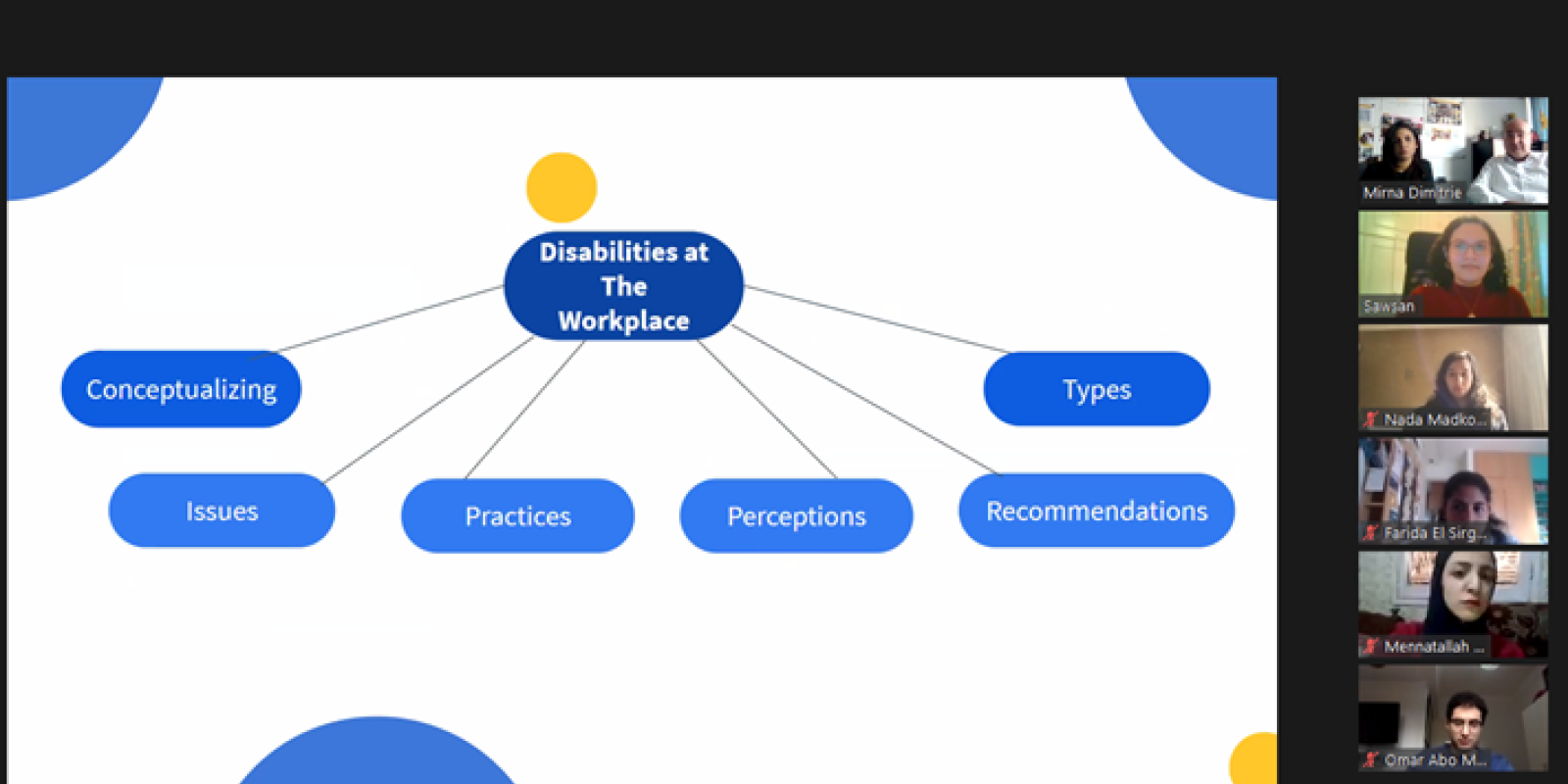
Creating an Inclusive Workforce: Students Help Integrate People with Disabilities into the Workplace
Taking an active stance to integrate people with disabilities into the workplace, students in Managing the Human Capital class engaged in a real-life, experiential learning project with DHL Global Forwarding to address this challenge. Their recommendations will be used by the company’s HR department.
“I really enjoyed the experience of coming up with real solutions for DHL,” reflected undergraduate student Menna Fathy. “It seemed easy at the beginning; however, the more research you do, the more details you have and the more complex the implementation of the solutions turns out to be. I feel that people with disabilities are underestimated in Egyptian society, and [we should all] raise awareness of how we can integrate them into the workplace.”
Estimates of people with disabilities in Egypt have ranged from 1.8% to 11% of the population from 2006 to 2011. The Egyptian law requires companies with 50 employees or more to hire 5% of people with disabilities. “People with disabilities are often paid the minimum wage and may be happy with that, so what we are seeing is a tick box exercise,” explained Nellie El Enany, assistant professor of management and course instructor. “Having a diverse workforce is one thing, but honest inclusivity takes time, strong leadership and an organizational culture of acceptance and empathy.”
One of the reasons behind the lack of integration could be that the recruitment and selection processes are not thoroughly thought out and aligned with the human resources strategy or that of the organization as a whole, explained El Enany.
“When you recruit and select, it should be regardless of disability. But then if somebody has a disability, you have to make the workplace work for them,” emphasized El Enany. “If organizations are not doing this, their workplace is not diverse and, therefore, cannot be inclusive. They are losing out on a whole talent pool that can add value to the organization. Rather than adding to existing social issues and stigmatizing people with physical and mental disabilities, organizations need to recognize how diversity and inclusion are positive for everyone, both within the workplace and the wider society.”
Throughout the course, students in El Enany’s class explored the conceptualizations of disabilities, how they differ across the world, the different disabilities and their impact on job acceptance rates, best practices, the perception of people with disabilities in the workplace – positive and negative disability discrimination - and how they impact the way people with disabilities perform and are being assessed.
“I believe that people with disabilities are not getting the opportunities they deserve just because of the stigma around disability in Egypt, which is extremely unfair in my opinion,” said undergraduate student Nada Madkour, based on her group project. “Policies should be implemented that protect people with disabilities and force organizations to provide them with equal opportunities of employment.”
Based on their wider research, students were then tasked with supporting DHL’s human resources department by providing recommendations of what can be done to recruit and train people with disabilities, highlighting whether the process would be different than the standard procedures and considering aspects including mobilities impairment, mental health awareness and learning difficulties. Students also provided practical recommendations for how DHL can make the most effective use of their current employees with disabilities to benefit both the organization and employees through training leaders and managers and rethinking the company culture.
“Honestly, I was surprised by the quality of the students’ research and their efforts to gather all this data,” said Fady Labib, HR director at DHL Global Forwarding. “While they were presenting, I felt they were experienced employees presenting a real business-life situation and giving valid suggestions for developing solutions. I will use their assignments and research to implement different aspects in DHL and, soon, you will hear about their ideas being used and processed.”
Labib recalled when he was closely involved in a family issue where the breadwinner was disabled and the family was suffering because their income didn’t match the average income of Egyptian families. “I thought to myself: Why do disabled people earn minimum wages? And then I realized it’s because companies like us don’t rely on their productivity. We just pay their minimum wages,” he said. “From there, I started to think that we need to leverage our disabilities workforce rather than pay them the minimum wages while they’re staying at home. I really believe that the young generations (Gen Z) who have a [good] education can view problems differently than us and suggest new ideas.”
